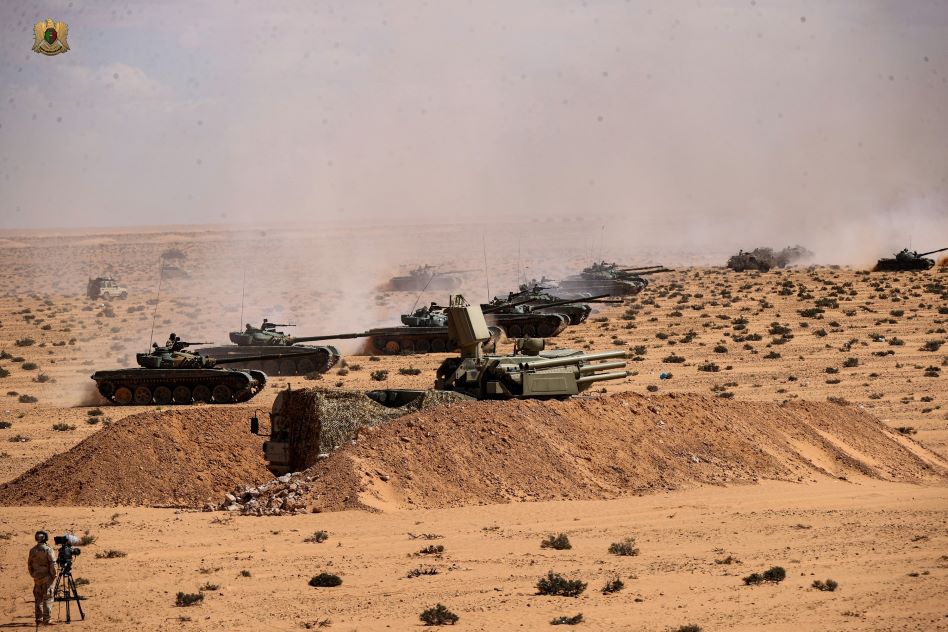What is Russian military buildup in Libya about?
Russia has been beefing up its military presence in Libya since the start of this year, with deployment of troops and offensive equipment intensifying during the past three months.
A consortium of investigative outlets - Verstka.Media, All Eyes on Wagner, Radio Liberty, and Sistema Project - learned that Moscow has been forging a strategic partnership with Khalifa Haftar, a powerful field marshal who controls the eastern part of Lybia, and is planning to do something really big there.
.jpg)
Former Russian defense minister Sergey Shoigu receiving Libyan General Khalifa Haftar in Moscow, 2017. Credit: Russian Defense Ministry
Since March, Russian warships have transported combat vehicles such as "Tigr" infantry vehicle and “Pantsir” anti-missile defense systems, “Sani” mine throwers, and other weapons for Haftar’s Libyan National Army (LNA). They also brought military instructors and contract troops who are now accommodated at a number of military bases including Jufra, Gardabya, Waddan, and Al-Marj.
Former Wagner mercenaries were spotted in the Russian African corps, too, but they are now part of the regular forces as the Kremlin has taken control over Yevgeny Prigozhin’s “domains” since the killing of the former warlord, the report says.
More to read:
Czech police officially confirm: Russian intelligence was behind Vrbětice explosion
The investigators used satellite images and photographs posted by Russian and LNA soldiers on social media to establish the exact geolocation of Russian military equipment and servicemen.
At least four military transporters were seen in Libyan ports in the first half of April alone.
By modest accounts, there are around 2,000 Russians in the civil war-ravaged North African country.
Some Russian military are involved in the training of LNA fighters, others are engaged in guarding and convoying shipments. In mid-March, LNA organized a large-scale drill under Russian guidance.

Russian instructors training LNA fighters in Libya. Credit: World Politics Review
Although the exact objectives of the growing Russian presence in Libya were never announced, military sources interviewed by the journalists claimed that the Russian contingent – which is led by four commanders who had previously served in Syria and report to Russian Deputy Defense Minister Yunus-Bek Yevkurov – is in Libya to assist Haftar in gaining control over the whole country and smuggle Libyan oil onto international markets, in return for sales proceeds.
The family of Khalifa Haftar now controls all oil production facilities in eastern Lybia and the oil terminals of Ras Lanuf and Es Sider (since 2015), shipping seized oil of at least one million barrels per day. Accordingly, Haftar's personal income is estimated to be about $450-500 million per month, if at least 5 million barrels a month are delivered.
More to read:
Communism has been Russia’s worst problem for past 100 years
On the other hand,
"Libya offers extremely valuable access to the Mediterranean, serves as a southern flank to put pressure on NATO and the E.U., and strengthens dialogue with other key Arab countries. Importantly, it also serves as a gateway to sub-Saharan Africa, offering a strategic route to such countries like Sudan, Niger and beyond,” an expert was quoted as saying.
The Kremlin’s cooperation with the Haftar family allows Russia to achieve both political goals and commercial interests with minimum costs.

LNA at military drills in March 2024. Credit: LNA
Vladimir Putin has a new source of revenue to finance the war in Ukraine, using Russian military personnel literally as cheap labor. By arming the rebel warlord, the Russian dictator is also betting on expanding the Libyan civil war, right under Europe’s coasts.
The United Nations insists on conducting the first free presidential elections in Libya in order to end the conflict but the dates of elections have been postponed several times due to ongoing fighting.
Libya is in severe humanitarian disaster since the civil war first broke out in 2011. Between 20,000 and 30,000 people are estimated to have been killed in this country and some 400,000 people have been displaced as a result of the conflict.
***
NewsCafe is an independent outlet that cares about big issues. Our sources of income amount to ads and donations from readers. You can support us via PayPal: office[at]rudeana.com or paypal.me/newscafeeu. We promise to reward this gesture with more captivating and important topics.


![[video] What if the Trump assassination attempt was staged?](/news_img/2024/07/18/news0_mediu.jpg)



